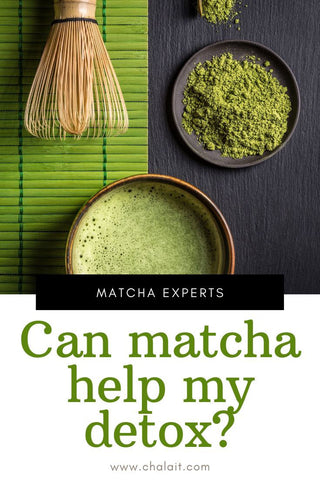A detox needn't be a torturous diet or something to dread. Instead, it can be an opportunity to rest, cleanse your body and nourish yourself from the inside out. We recommend using matcha tea to help you gently detoxify your body of chemicals and heavy metals. The refreshing tea will also replenish your body with a host of powerful antioxidants while calming the racing mind.
Another reason to add Matcha to your detox diet is for its digestive qualities. The active ingredients of polyphenols will help to reduce inflammation in the intestinal tract will also helping to produce an environment for good gut bacteria to thrive.
How to use matcha in a detox
Most detoxes will require you to omit caffeine. The withdrawal from coffee can sometimes be the most unpleasant part of the whole detox; giving way to headaches, cravings and a lurgy that cannot be saited for up to a week.
Matcha helps to fill this gap, providing you with a subtle supply of caffeine. Unlike the caffeine that comes from coffee beans, the caffeine in Matcha is released slowly into your system along with L-theanine, giving you a steady supply of energy and clarity without the crash.
The best detox is one that is endorsed by your health practicioner. This will normally include limited amounts of red meat and dairy with a focus on whole foods without added sugars or processed foods.. Alcohol is a no-no, and often coffee is also. This type of detox is usually limited to a small amount of time.
We would suggest you use Matcha to replace your normal caffeinated drink. Enjoy up to 3 servings per day.
How does chlorophyll help in a detox?
Matcha comes from the Camellia Sinensis plant, the same plant that produces both black tea and also green tea. While it may be the same plant, each tea has a significantly different nutritional profile. This comes down to how the plant is grown and the processes after the tea leaves have been picked.
Unlike green tea and black tea, to produce Matcha, the leaves grow in the shade in the final month of growth. This process boosts the production of chlorophyll and L-theanine. These ingredients make Matcha especially beneficial during a detox.
How chlorophyll helps your body
- Cleans out your digestive system
- Boosts your red blood supply
- Helps to neutralise chemicals and pollutants
- Assists in ridding the body of heavy metals by binding to them (chelate)
- A good source of magnesium
- Promotes an increase in HDL Cholesterol (good cholesterol)
Are all detox teas equal?
To be honest, teas that are marketed specifically for detox purpose are the ones health practitioners are most weary of. These teas often contain a variety of synthetic ingredients which can cause damage to your kidneys or liver. Some detox teas may even contain Matcha powder, however, its other ingredients may be dubious or may conflict with your body.
Pure Matcha powder is certainly the best choice. When choosing a matcha powder look for one that is a vibrant green to show its authenticity. The vibrancy will also demonstrate its freshness. We recommend the Chalait everyday ceremonial Matcha. This authentic Matcha powder comes from Japan and is abundant in Chlorophyl and L-Theanine
How to drink matcha
You're in luck, there are a few ways you can enjoy your matcha powder, mixing it up during your detox will help the time fly. Most people enjoy a matcha shot in the morning before heading off to work or to energise them before a workout.
Another favourite is the Matcha Latte. Mixing a matcha shot with steamed (or frothed) milk of choice. If you find the taste of matcha a little overpowering, then give the Matcha Americano a go. This is basically a Matcha shot prepared with double the amount of water.
Matcha can also be added to a smoothie, turning your ordinary breakfast or afternoon smoothie into a nutrient powerhouse.
Learn More: Matcha Recipes
What does matcha taste like?
A good quality matcha is not at all unpleasant. It offers a complex flavour comprising of a light earthiness, with a light savoury, and a subtle sweetness taste.
Disclaimer: Before you begin any diet it is important to discuss this with your health care professional. Any advice given here is to promote the use of Matcha powder.



